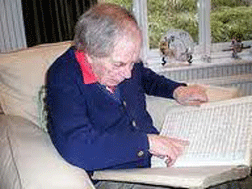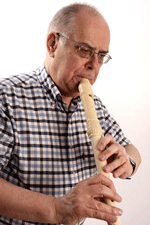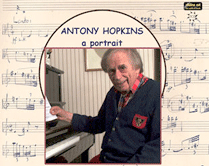|
Antony Hopkins 90th Birthday Concert & Portrait CD

"an evening of great warmth, fun
and delight."
May 20th 2011, Civic Centre, Berkhamsted
The Berkhamsted Music Society, which has presented illustrious rostra of concert artists over the years, celebrated their distinguished local composer and musician, Antony Hopkins CBE (born 21 March 1921), who has served as their President for forty-seven years of this Music Society’s fifty-seven seasons.
This very happy and special event, played to a packed hall, was given by the recorder virtuoso John Turner, the captivating soprano Lesley Jane Rogers and pianist Janet Simpson, the programme introduced and hosted by chairman Humphrey Norrington.
After several tributes, including telegrams from the Director General of the BBC, Peter Maxwell Davies & Humphrey Burto, the concert got off to a delightful start with Antony Hopkins’ Three French Folk Songs, happily re-arranged for soprano, recorder and piano. On this sunny spring evening these songs charmingly evoked the French chanson of Chaminade, Hahn, and Parisian café society.
John Turner treated us to John Parry’s The Nightingale Rondo, a rare nineteenth century virtuoso concert piece originally composed for flageolet and piano, with runs, trills and bird-calls from John and some very nimble finger-work by Janet Simpson. Come again sweet Love by Dowland and Purcell’s Music for a while preceded the well known Sonata in F by Handel which completed the selection of baroque pieces. originally composed for flageolet and piano, with runs, trills and bird-calls from John and some very nimble finger-work by Janet Simpson. Come again sweet Love by Dowland and Purcell’s Music for a while preceded the well known Sonata in F by Handel which completed the selection of baroque pieces.
First performances of five newly composed works, written in tribute to Antony Hopkins for this occasion, were featured, with five composers seated on the front row alongside him.
David Matthews' gentle A little Pastoral for solo recorder was based on the notes A & B; and Pieds-en-l’Air, a short piece for recorder and piano by Elis Pehkonen, based on Antony’s favorite tune from Warlock’s Capriol Suite, also paid homage by using the notes A & B. It’s familiar tune, mildy disguised by uneven though catchy rhythms, was well received by the audience.
William Alwyn’s Seascapes involved all three performers. This work, written for John Turner, is in the Naxos series of Alwyn’s collected oeuvre. The settings are of poems by Alwyn’s friend Michael Armstrong, both lovers of the sea and these four short songs beautifully evoked its ever changing moods.
During the intermission Mr. Hopkins was presented with a large birthday cake which was then eagerly shared by the audience. His impromptu address to his devoted audience was amusing and entertaining and delivered in a voice, still instantly recognized from those thirty-six years of BBC Radio Broadcasts Talking about music, treasured by so many music lovers and musicians.
Part two began with Hopkins’ Pastiche Suite, three little miniatures for recorder and piano. The composer amused the audience by telling us he had no recollection of writing these pieces and so it would be a first performance for all. The work was discovered, thanks to John Turner, in the Beecham music collection at Sheffield University. The score, in Hopkins’ distinctive hand is inscribed to his friend Walter Bergman and was written some 67 years ago.
Three first performances followed; Gordon Crosse’s vocalize for soprano, recorder and piano titled CantAHta (sung to Ah) was both witty and atmospheric, and evoked the soundscape of Brittens’ Suffolk and his Peter Grimes. Anthony Gilbert’s three minute contemporary piece Above all that for recorder and piano paid tribute to Antony Hopkins’ passion for racing cars, beginning with sounds that depicted a car with a somewhat dodgy engine. Last of the tributes, though in this instance without any reference to A.H. was a beautiful lyrical setting of a poem by Douglas Gibson Evening in April composed by David Dubery for voice, recorder and piano, which prepared the audience for three songs from the golden age of English Song; Robin Goodfellow, by Peter Warlock, well characterized by Lesley Jane, and Now sleeps the crimson petal and Love’s Philosophy by Roger Quilter.
The final Hopkins work was Three Seductions for recorder and piano, re-worked from Schott's Woodwind Series three pieces for flute and piano. The three short light hearted movements are Wanton Waltz, Flirtatious Fancy and Sensuous Sarabande, (treble recorder for the outer movements and descant for the inner one). Finally Nicholas Marshall’s three arrangements of folksongs songs from Carousel starting with his charming arrangement of Lavender’s Blue and two comic songs Haliky Daliky, and Aiken drum engagingly sung by Lesley Jane Rogers.
Once again John Turner has demonstrated on his recorders the huge variety of musical styles possible on this instrument that still has validity in the new millennium,* ably supported by Janet Simpson.
Duncan Fergusson
23 May 2011
* a major understatement ! Google "recorders" in Musical Pointers ! [Editor]
Antony Hopkins Portrait CD
Antony Hopkins: Sonata for Viola and Piano
A Humble Song to the Birds (tenor and piano)
Partita in G minor for solo violin
Rondo from Piano Sonata no. 2 in F sharp minor
Piano Sonata no. 3 in C sharp minor
Suite for descant recorder and piano
Pastiche Suite for recorder and piano
Three French Folksongs (soprano and piano)
Tango for piano
Three Seductions, for recorder and piano
First Love, for soprano and piano
I've Lost my Love, for soprano, recorder and piano
A Melancholy Song, for soprano, recorder and piano
Four Dances, for recorder and piano
Three Poems
Lesley-Jane Rogers (soprano), James Gilchrist (tenor), John Turner (recorder), Paul Barritt (violin), Matthew Jones (viola), Philip Fowke (piano), Michael Hampton (piano), Janet Simpson (piano), Antony Hopkins (speaker/piano); Jeremy Brett, Stephanie Voss, Phillada Sewell, Elizabeth Boyd, Stephen Manton, Eric Shilling
Divine Art dda 21217 (2CD)
A generous double-CD which is well deserved, and closely linked with the above concert, with eight tributes to Antony Hopkins played by John Turner.
Peter Grahame Woolf
|

